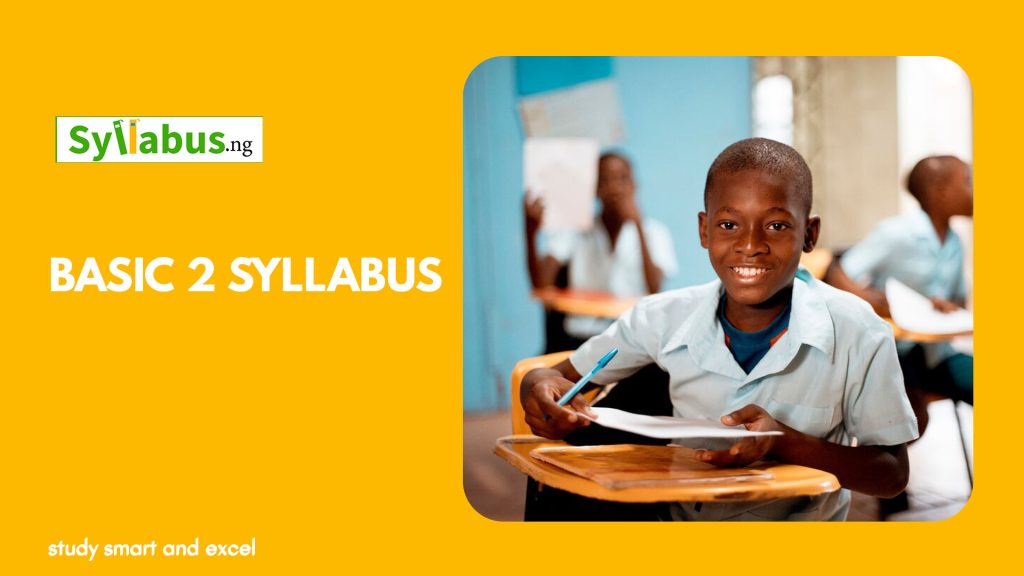Download the Unified Basic 2 Scheme of Work for Civic Education, to serve as a guide for educators and primary school teachers

Home » Primary 2 Scheme of Work » Primary 2 Civic Education Scheme of Work
The Civic Education subject is designed to teach the pupils about their civic responsibility and values. The scheme for primary 2 is still the introductory class for civic education, the topics treated are designed to get them familiar with what civic education is and the value attached to them.
Some of the topics to be covered under civic education for primary 2 are; Why civic Education, Components of Civic Education, honesty, community, importance of greeting members of the community, road signs and traffic lights.
These topics are relatable to the pupils’ everyday lives. At the end of each class, the pupils should be asked to relate and apply the values taught to their everyday lives.

Know what’s expected of you as an educator
Download the Lagos State Unified Scheme of Work for Primary 2 Civic Education
| LAGOS STATE GOVERNMENT MINISTRY OF EDUCATION UNIFIED SCHEMES OF WORK FOR PRIMARY SCHOOLS | ||
| Civic Education Education Scheme of Work for Primary/Basic 2 | ||
| CLASS | Primary/Basic 2 | |
| SUBJECT | Civic Education | |
| TERM | First Term | |
| WEEK | TOPICS | Learning Objectives |
| 1 | Revision/importance of civic education | Pupils should be able to i. discuss some topics taught last term ii.explain civic eduaction and the importance of civic education iii. identify the advantage of civic education |
| 2 | Why study civic education | Pupils should be able to i. explain civic education ii. identify the reason for the study of civic educatiion iii. discuss the reason why they study civic education at school |
| 3-4 | Component of civic Educadon -Right and duties Democratic practices Community -Values | Pupils should be able to: i. Explain component of civic educaåon ii. Identify component of civic educadon iii. Describe where and how civic education take place |
| 5 | Importance of Civic Eduaction to development | By the end of this lesson, pupils should be able to: i.discuss the importance of civic education to national development ii. discuss and describe the institution of government democratic process iii. identify acquired skills for national development |
| 6 | Importance of Civic Eduaction to development. contd. Civic engagement in the political, social and economic process | By the end of this lesson, pupils should be able to: i. highlightt the importance of civic education to national development ii. explain the role of civic education in political process iii.social process-economic process iv. identify the importance of having political leaders in the society |
| 7 | MID TERM BREAK | |
| 8 | Honesty -meaning -the imporatnce of telling the truth always -reward of honesty e.g praise, gift, promotion etc. – punishment of dishonesty e.g shame, beating, disgrace etc. | By the end of this lesson, pupils should be able to i. explain the meaning of honesty ii. identify the importance of telling the truth always iii. outline the reward of honesty iv. describe the punishment of dishonesty |
| 9 | Courtesy, politeness and etiquette -meaning -treating other people with courtesy and proper behavior in the street, buses, trains and queues | By the end of this lesson, pupils should be able to: i. Identify their roles in the society as regarding courtesy and politeness ii. Outline ways to be responsible in the public |
| 10 | Revision | Revision |
| CLASS | Primary/Basic 2 | |
| SUBJECT | Civic Education | |
| TERM | Second Term | |
| WEEK | TOPICS | Learning Objectives |
| 1 | Welcome Test Revision of First Term | Pupils should be able to: i. Discuss some topics taught in first term ii. Importance of civic education. iii.Honesty-The importance of telling the truth always |
| 2 | Community -Meaning of community – Types of community -Modern communites/institution e.g. School community | Pupils should be able to: i. explain the meaning of a Community ii. identify types ofcommunity with examples iii. describe the various types of community |
| 3 | Meaning and importance of greeting Members of the community -Father -Mother -Siblings -Community Leaders Balee, chief, Obi and Emir | pupils should be able to: i. outline members of the community -Father ii. identify the roles of community leaders. iii. differentiate between community leaders(Balee, Chief, Obi and Emir) |
| 4 | Rules in the community -Obedience -loyalty -Cooperation -Peaceful coexistence -Orderliness -Sanitation -Respect | Pupils should be able to; – explain the meaning of Rules’ – outline Rules in thcommunity, – describe each rules in the community |
| 5 | Community leaders e.g •Yoruba-Oba -Igbo-Eze -Benin-Enugo -Alupo-Etsu -Ebira-()hinoyi -Other title holders in the communit | Pupils should be able to: i. explain who a leader is ii. identify at least five ethnic group Nigeria iii. describe each title leader |
| 6 | Roles of community leaders – settlement of disputes -ensuring peace – organizing community work – link between the government and the community | By the end of this lesson, pupils should be able to: i. explain the roles of community leaders ii. identify the roles of community leaders iii. differentiate between dispute and peace |
| 7 | MID-TERM BREAK | |
| 8 | Qualities of a community leader -Caring -Wise -Patient -Courage Intelligent -Integrity -Honesty | By the end of this lesson, pupils should be able to: i. identify the qualities of a community leader ii. explain atleast four quality of a community leader iii. outline the importance of those quality |
| 9-10 | Kinds of work in our community e.g -Farming -Weaving -Woodwork -Cattle rearing -Trading -Fishing Kinds of works in our modern community -A Doctor -An Engineer -A lav,yer -A teacher -A soldier A pastor Reasons for workinø | Students should be able to: i. explain reason why we work ii. identify at least six types of work in the local community iii. describe the tools used to work done in the community |
| 11 | Conscience -Meaning -Man’s possession of free will to do good or evil -Man’s feelings when he does evil-guilt conscience coupled with restofmind | Pupils should be able to: i. Explain the meaning of Conscience ii.Discuss the word joy, guilt iii. Importance of Conscience to our daily lives |
| 11 | REVISON | |
| 12 | EXAMINATION | |
| CLASS | Primary/Basic 2 | |
| SUBJECT | Civic Education | |
| TERM | Third Term | |
| WEEK | TOPICS | Learning Objectives |
| 1 | Revision/welcome Test | Pupils should be able to: -Answer some question on last term’s topics |
| 2 | Community leadership in Nigeria traditional setting | Pupils should be able to; i. explain who a leader is with examples ii. identify the three major ethic group in Nigeria iii. outline the traditional title of the community leadership in the major ethnic groups |
| 3-4 | Duties of a community leader | Pupils should be able to: i. explain the meaning Duties ii. discuss the duties of a community leader Same groups iii. Outline the Characteristics of a good leader |
| 5 | Reward of community leaders | Pupils should be able to: i. explain ffe meaning of reward ii. outline the importance of reward iii. identify ways community leaders are rewarded. |
| 6 | Other duties of a community leader -Keeping peace/Ensuring peaceful coexistence among his people -Organizing Community work -Ensure the provision of basic social amenities for the citizens | Pupils should be,able to: i. Identify other duties of community leaders ii. Explain the duties of other iii. Outline the importance of the community leaders duties to the society |
| 7 | MID-TERM BREAK | |
| 8 | Humility -Meaning -Reason why people should be humble | Pupils should be able to: i. describe the word Humility ii. Identify reasons why people should be humble e.g to exalt and recommend iii. highlight the advantages of humility |
| 9 | Qualities of Community leadership | Pupils should be able to: i. Explain Who a leader is ii. highlight atleast 10 qualities of community leaders iii. identify importance of good qualities of community leaders |
| 10 | Road Signs and Traffic light -meaning -types -importance of road signs and traffic light | By the end ofthis lesson, people should be able to i. explain the meaning of roadsigns and traffic light ii. identify and interprete various road signs and traffic light iii.highlight the importance of traffic light and signs iv. differentiate between signs and traffic light |
| 11 | Revision | Revision |
| 12 | EXAMINATION | |
Civic Education- Main Text
Civic Education-Workbook
Teacher’s Guide

Know what’s expected of you as an educator
Download the Lagos State Unified Scheme of Work for Primary 2 Civic Education